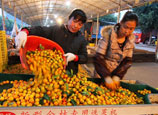
Due to the violence and explicit sex scenes, none of his works has been included in Chinese high school textbooks in Shanghai, according to Wang Tiexian, chief editor of Shanghai's high school textbooks.
Mo's early novella "The Transparent Red Carrot" (1985) established his reputation. Written from a boy's perspective and without sex or violence, it is included in the textbook for Chinese literature majors in universities.
"The bloody and sex scenes in his books definitely made it difficult to include them in high school texts. And his key works are mostly novels, which also makes it difficult because only part can be included and it doesn't reflect the whole work," Wang says.
After the Nobel announcement, Wang suggested including excerpts from "The Transparent Red Carrot" in high school texts. The story is told by a poor child who hopes to find the beautiful, transparent red carrot that he once saw in a field.
Chinese critics and academics have long expressed their disappointment in contemporary Chinese literature and in writers for lacking originality and spiritual and philosophical depth, and for failing to tap the richness of traditional Chinese literature.
After the Nobel announcement, many of these critics reversed themselves and praised Mo, some even praising the entire body of contemporary Chinese literature.
Chen Xingeng, editor-in-chief of the weekly newspaper Literature Paper, says he has received glowing reviews from same authors who once severely criticized Mo. After the announcement, the very points they deplored are now described as strengths.
"It's great he has won such an important prize and, hopefully, the event can bring more readers to contemporary Chinese literature. But that must not eclipse the problems in his works, and the problems in contemporary Chinese literature," critic Lei says.
He cites lack of originality as a great problems, adding that writing today is marked by increasing quantity but not quality. When a book becomes popular, thousands of copies can be produced overnight, but rarely do writers plumb spiritual depths or reveal psychological complexity or linguistic subtlety.
The consensus is that serious literature is declining.
Wang Zheng, a writer and critic from Jiangsu Province Writers' Association, says the quality problem is difficult to overcome.
"Society, which is increasingly materialistic and consumption-driven, has stopped providing motivation for writers to explore serious issues. The problems of lack of originality and depth cannot be solved without changes in the society," he concludes.
Diverse Chinese novels in English
Many excellent Chinese contemporary novels have been published in English and Shanghai Daily recommends the following:
"Three Sisters" by Bi Feiyu
Translated by Howard Goldblatt and Sylvia Li-chun Lin
Bei Feiyu, based in Jiangsu's capital city of Nanjing, is known for his understanding and sophisticated portrayal of female characters. Some of his best-known books feature female protagonists, such as "Three Sisters," which won the 2010 Man Asian Literary Prize.
"Sisters" consists of three novella following three of the seven Wang sisters. Their mother kept getting pregnant until the eighth child, a boy, was born. The sisters struggle to change their destinies after the sacking of their father, once a village official.
"Red Poppies: A Novel of Tibet" by Alai
Translated by Howard Goldblatt and Sylvia Li-chun Lin
Alai is one of few ethnic Tibetans writing in Mandarin. The Sichuan Province native was editor-in-chief of a popular science fiction magazine. His own novels, while not sci-fi, are imaginative and adventurous, focusing on mysterious Tibetan society.
"Red Poppies" is set in the 1940s and follows the family of a Tibetan chieftain, who has a Tibetan and a Han wife.
A smart and brave son is born to the Tibetan wife and a younger boy born to the Han mother. This boy feigns foolishness to escape family and clan power struggles.
"Turbulence" by Jia Pingwa
Translated by Howard Goldblatt
Jia Pingwa, born in a village in Shaanxi Province, is considered among the best contemporary writers. Most novels are set in Shaanxi and explore the huge transformations in Chinese villages and small cities through the lives of ordinary people.
"Turbulence," which won the Pegasus Prize for Literature, follows the lives of young farmer Golden Dog and Water Girl in the 1980s, in the early stages of China's opening-up and reform.
Ambitious Golden Dog becomes a reporter and gets entangled with bureaucrats, blacksmiths, artisans, monks and other intriguing characters.
 |














 Cumquat market in S China's Guangxi
Cumquat market in S China's Guangxi


![]()
